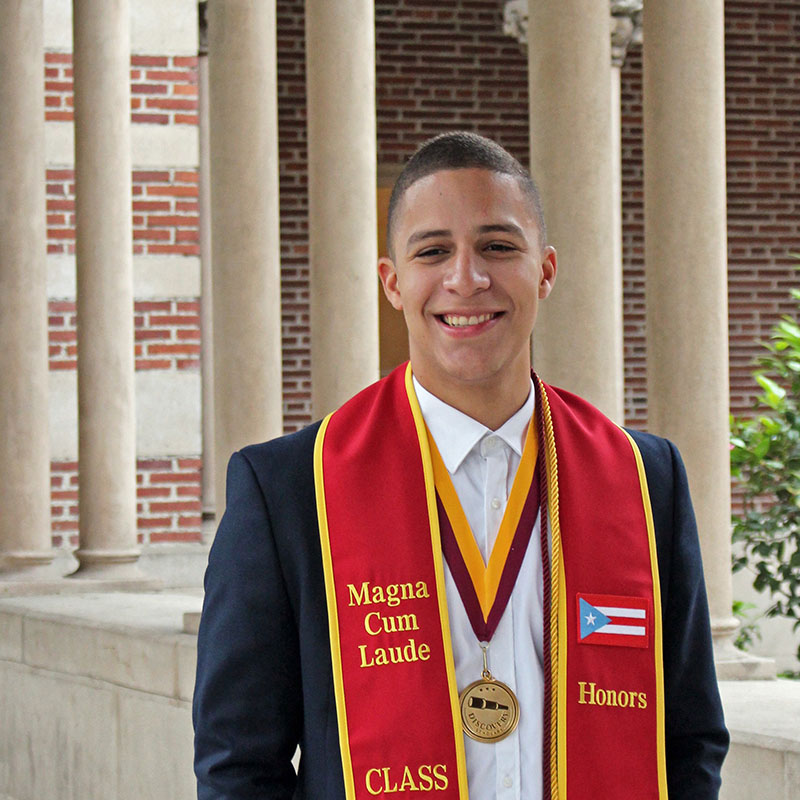
We congratulate Hector on his admittance to Stanford, where he will pursue a joint JD/Econ PhD as of Fall 2021!
INITIATIVE AFFILIATION
- Fellow (2019-2021)
- Member, Peer & Mentor Network
EXCELLENCE, AT-A-GLANCE
PhD program: Stanford University
Research Spotlight: “The Baker Hypothesis,” NBER Working Paper 27708: Anusha Chari, Peter Blair Henry, and Hector Reyes (2020).
BS in Economics and Mathematics, USC (2019)
Meet Hector Reyes
Hector completed his Bachelor of Science in Economics and Mathematics at the University of Southern California (USC), where he graduated Magna Cum Laude in 2019. He developed an early interest in economics after witnessing compatriots struggle to overcome Puerto Rico’s decade-long recession. Hector began his college career at Valparaiso University as a student-athlete on the Track and Field Team.
In More Detail
As a first-generation college student at USC, Hector received numerous research fellowships. He became an Easterlin Fellow in Economics in 2018, and received multiple Provost Undergraduate Research Fellowships. Hector served as a research assistant analyzing Colombia’s influential role in American politics for the Lab on Non-Democratic Politics in the USC Dornsife School of International Relations, where he later became Lab Director.
Beyond USC, Hector was a Stanford GSB IDDEAS Scholar and a participant in the advanced track of the AEA Summer Training Program; he also was a finalist for two prestigious national scholarships: the Truman and the Rhodes.
Hector transferred to USC in the fall of 2017, after beginning his college career at Valparaiso University, where he joined multiple campus organizations aimed at promoting awareness and inclusivity of multicultural identities. Following the devastation of Hurricane María in September 2017, Hector helped coordinate fundraising and donation campaigns that raised $250,000 for Puerto Rican recovery efforts.
Why Economics: In His Own Words
Carlos and I were close friends growing up in Puerto Rico, but the families we were born into led us to sharply different experiences and opportunities. Early on, my family was able to afford to send me to a private primary school, which in turn allowed me to earn a basketball scholarship to a private high school. There, I expanded my English vocabulary, immersed myself in learning world history, and had the opportunity to master many areas of mathematics. Carlos’s family, in contrast, was not able to send him to a private primary school. I remember one day in ninth grade he called to say that he had been home all day. His teachers were regularly absent, sometimes three times a week. When his school was open, students routinely sold drugs between classes, often with the school’s knowledge. This injustice haunted me. Why did such disparities persist across the island, and what could I do about them?
“I applied to the PhD Excellence Initiative because I knew it would provide the resources and mentorship necessary to pursue and succeed at a doctoral program in Economics. This in turn will give me the best possible foundation for a career as a professor, advisor, and public servant. Puerto Ricans have endured hardship, suffering, and despair stemming from centuries of colonialism, and topped off most recently with the brunt of Hurricane María. Becoming an established scholar is the first step toward policy relevance.
“I was also particularly interested in this program because of similarities I saw in Dr. Henry’s experience and my own: we both come from a Caribbean island; early life experiences in our native nations drew us to the field of economics; and we’re both interested in the role of institutions in economic growth—as well as addressing inequality across the world.”
Hector envisions using his training to become an economic advisor to the government, a role he hopes will allow him to shed light on his compatriots’ most pressing political and economic concerns. Obtaining a PhD in Economics “will give me the expertise and credibility to usefully serve and advocate for the people of Puerto Rico.”
Extra Credit: Q & A with Hector
Passion + aptitude. I believe that if one is passionate about something and has an aptitude for hard work one can succeed at mostly everything.
Nobel Laureate Arthur Lewis said, “Nations have opportunities which they may grasp if only they can summon up the courage and the will.”
Sports!!!!! My grandfather, Hector Reyes, is known as a basketball legend in Puerto Rico. He holds a record for five consecutive titles and his performance led him to become president of the Puerto Rican Basketball Federation. My father, Hector Reyes Jr., played professionally for three years, then led the Junior National Team to the championships. In my case, excelling in track allowed me to join the Division I Track and Field team at Valparaiso University. Athletics is a family tradition that developed my sense of determination. Subsequently it led me to refine my career goals in academia and economic justice for the people of Puerto Rico.
The books I’d want to have on hand are…
War Against All Puerto Ricans, by Nelson Antonio Denis
Why Nations Fail, by Daron Acemoglu and James Robinson
Candide, by Voltaire
It may sound cheesy, but I am bound to say Puerto Rico. The passion I feel for my island is what has driven me, drives me, and will drive me until the wheels fall off.
Talking on FaceTime to my nephews.